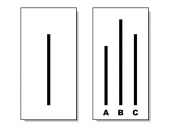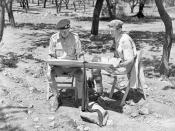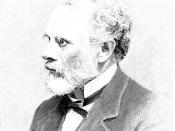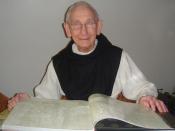Decisions a character makes determine the way he is perceived in the book. These decisions determine cowardliness or boldness, determination or defeat. John and Bernard are somilar characters who share many of the same views on society and its corruptness; however, their opposing beliefs on conformity and identity differentiate them. John is a unique individual in this society because he doesn't fear public opinion or criticism. First of all, John sees this brave new world as an opportunity to change the evil to good in man. John has no regard for how he is perceived by others, but instead looks for the possibility of good in all people. He is different from all others because he avoids conformity and evil, but attempts to see the good in all things. In addition, John fearlessly causes a riot when he reveals the citizens' potential freedom and manhood. Even though his attempts to change society are rejected, John still stands alone and confident.
He is nothing like the others who fear individuality. Furthermore, when John takes his own life his feet dangled ". . . like two unhurried compass needles . . . east . . ."ÃÂ (267). Though John is no longer with them, he still guides the members of the world state as a compass guides the lost. John's violent ending signified a new, but desolate, beginning for the citizens. John finds a concealed hope in the society, but realizes he does not have the power to reveal it alone.
Bernard has the power to reveal the hope in society, but he simply does not have the confidence and individuality that is needed to perform such a task. For example, Bernard is best described when John remarks, "If one's different, one's bound to be lonely"ÃÂ (139). Bernard admits to his own loneliness and knows that he is different from others. However, Bernard hesitates to join the rioting in the hospital because he fears being ashamed of embarrassed. As much as Bernard wants to change society, he won't risk his own pride. Bernard's need for conformity overpowers his desire for improvement. Finally, Bernard yearns to fit in because he fears "[being] labeled as the friend of a man who said he didn't like civilization . . ."ÃÂ (224). Bernard's own reputation comes before sacrificing himself for the good of his civilization. Though Bernard is aware of a need for change, he can't risk the possibility of being rejected by his peers. Bernard is like a ticking bomb; he has so much potential power, but it needs to be unleashed.
Both, John and Bernard are highly concerned about their ignoble civilization. These men want to change the status quo, and are aware of what it would take to do so. However, John is not capable of this because he wants it so badly that he can't wait for nature to run its course. Bernard doesn't want the change bad enough because it undermines his desire to fit in. Both of them have the power to move mountains when they take a stand together, but in a world of virtually no individuality, they don't





